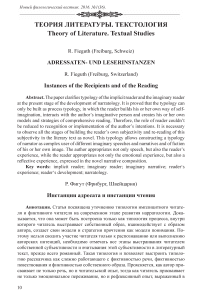Instances of the recipients and of the reading
Автор: Fieguth Rolf
Журнал: Новый филологический вестник @slovorggu
Рубрика: Теория литературы. Текстология
Статья в выпуске: 1 (36), 2016 года.
Бесплатный доступ
The paper clarifies typology of the implicit reader and the imaginary reader at the present stage of the development of narratology. It is proved that the typology can only be built as process typology, in which the reader builds his or her own way of self-imagination, interacts with the author’s imaginative person and creates his or her own models and strategies of comprehensive reading. Therefore, the role of reader couldn’t be reduced to recognition or implementation of the author’s intentions. It is necessary to observe all the stages of building the reader’s own subjectivity and re-reading of this subjectivity in the literary text as novel. This typology allows constructing a typology of narrator as complex user of different imaginary speeches and narratives and of fiction of his or her own image. The author appropriates not only speech, but also the reader’s experience, while the reader appropriates not only the emotional experience, but also a reflective experience, expressed in the novel narrative composition.
Implicit reader, imaginary reader, imaginary narrative, reader's experience, reader's development, narratology
Короткий адрес: https://sciup.org/14914754
IDR: 14914754
Список литературы Instances of the recipients and of the reading
- Pfeiffer H. Produktionsasthetik//Literaturwissenschaft. Bd. 1. Berlin; New York, 2007. S. 283
- Weimar K., Solms F. Geschmack//Reallexikon der deutschen Literaturwissenschaft. Bd. 1. Berlin; New York, 2007. S. 714-717
- Ulicka D. Słowa i ludzie. 10 szkiców z antropologii filologicznej. Warszawa, 2013. S. 95
- Ingarden R. Gegenstand und Aufgaben des ‘Wissens von der Literatur’//Ingarden R. Gegenstand und Aufgaben der Literaturwissenschaft. Aufsätze und Diskussionsbeiträge (1937-1964). Tübingen, 1976. S. 1-28
- odička F. Die Konkretisation des literarischen Werks. Zur Problematik der Rezeption von Nerudas Werk//Vodička F. Die Struktur der literarischen Entwicklung. München, 1976. S. 87-125
- Vodička F. Die Literaturgeschichte, ihre Probleme und Aufgaben//Vodička F. Die Struktur der literarischen Entwicklung. München, 1976. S. 1-86
- Červenka M. Der Bedeutungsaufbau des literarischen Werks. München, 1978
- Głowiński M. Der virtuelle Empfänger in der Struktur des poetischen Werkes//Literarische Kommunikation/R. Fieguth (Hrsg.). Kronberg (Ts.), 1975. S. 93-126
- Głowiński M. Style odbioru. Szkice o komunikacji literackiej. Kraków, 1977
- Okopień-Sławińska A. Die personalen Relationen in der literarischen Kommunikation//Literarische Kommunikation/R. Fieguth (Hrsg.). Kronberg (Ts.), 1975. S. 127-147
- Sławiński J. Die Semantik der narrativen Äußerung//Sławiński J. Literatur als System und Prozeß/R. Fieguth (Hrsg.). München, 1975. S. 81-109
- Sławiński J. Literatursoziologie und historische Poetik//Sławiński J. Literatur als System und Prozeß/R. Fieguth (Hrsg.). München, 1975. S. 173-202
- Bartoszyński K. Probleme der Kommunikation in narrativen Werken//Literarische Kommunikation/R. Fieguth (Hrsg.). Kronberg (Ts.), 1976. S. 149-176
- Iser W. Der implizite Leser. München, 1972; Iser W. Der Akt des Lesens. München, 1976
- Schmid W. Elemente der Narratologie. Berlin; Boston, 2014
- Ingarden R. Vom Erkennen des literarischen Kunstwerks/R. Fieguth, E. Swiderski (Hrsg.) Tübingen, 1996
- Schmid W. Thematische und narrative Äquivalenz. Dargelegt an Erzählungen Puškins und Čechovs//Russische Erzählung. Russian Short Story. Russkij rasskaz/R. Grübel (ed.). Amsterdam, 1984. P. 79-118. (Studies in Slavic Literature and Poetics. Vol. VI)
- Fieguth R. Zur Rezeptionslenkung bei narrativen und dramatischen Werken//Sprache im technischen Zeitalter. 1973. № 47. S. 186-201
- Schmid W. Elemente der Narratologie. Berlin; Boston, 2014. S. 246
- Butor M. Répertoire II. Paris, 1964. P. 63; Netzer K. Der Leser des Nouveau Roman. Frankfurt am Main, 1970. S. 118
- Lüscher J. Frühling der Barbaren. Novelle. München, 2013
- Fludernik M. Second Person Fiction. Narrative You As Addressee And/Or Protagonist//AAA -Arbeiten aus Anglistik und Amerikanistik. 1993. № 18. S. 217-247
- Fludernik M. Second Person Fiction. Narrative You As Addressee And/Or Protagonist//AAA -Arbeiten aus Anglistik und Amerikanistik. 1993. № 18. S. 217-247


